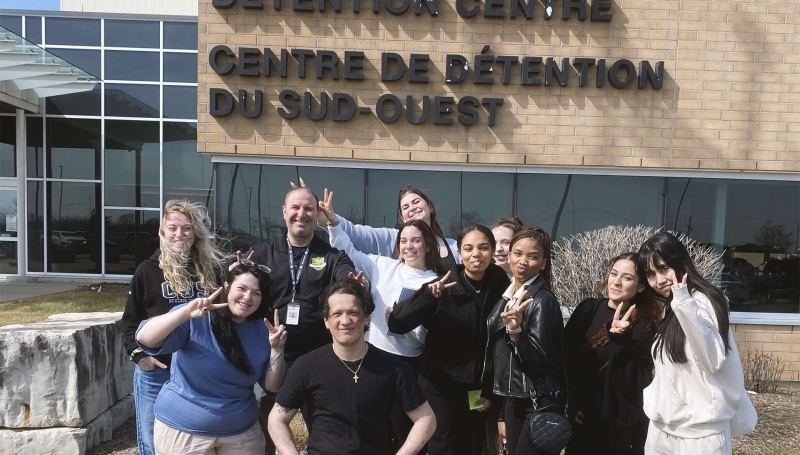This program is delivered at our downtown campus, the St. Clair College Centre for the Arts. If you’re staying in residence, which is located at our main campus, it is a quick 20 minute bus ride to our downtown campuses. The bus stops directly behind the St. Clair College Centre for the Arts. The MediaPlex is one block south of the Centre for the Arts.
Program Overview
The Community and Justice Services program focuses on at-risk and high-risk client groups in both community and institutional settings. The nature of these environments and the diversity of clients demand a highly trained workforce able to intervene effectively using best practices in order to ensure the protection of the public and the safety of the community, staff, and clients. This program is designed to prepare students for front-line careers in the justice system with attention to custody, risk assessment, case management, intervention strategies, and reintegration.
Program Highlights
- The comprehensive curriculum involves both theory and hands-on learning and prepares students for a wide variety of careers related to institutional and community-based services as well as other areas of law enforcement.
- Specialized courses such as Youth in Conflict with the Law, Institutional Correctional Practices, and Restorative Justice are taught by field experts providing first-hand expertise about existing issues and current trends.
- Students obtain invaluable experience working with at-risk client groups through an intensive work placement experience. This connects students to the community and many employment opportunities.
- Students will complete fitness activities to prepare them for the occupational physical requirements for careers in border, correctional and police services.
Career Opportunities
Careers may be based in youth facilities; federal and provincial correctional institutions; justice agencies; policing and community agencies, programs and services.
Degree Completions
St. Clair College has an articulation agreement with Athabasca University that allows graduates of the Community & Justice Services program to pursue a university degree to further their career and/or academic studies.
Students can receive credit towards Athabasca University’s Bachelor of Commerce (Post Diploma), Bachelor of Management 3Yr (Post Diploma), Bachelor of Human Resources Labour Relations (Post Diploma), Bachelor of Science (Post Diploma), or Bachelor of Professional Arts programs, including:
- Human Services Major (HSRV)
- Criminal Justice Major (CRJS)
- Governance Law & Management Major (GLM)
- Communication Studies Major (CMNS)
Students interested in this pathway are encouraged to connect directly with Athabasca University.
Admission Requirements
OSSD with the majority of courses at the College(C), University (U), University/College (M) or Open (O) level plus:
- Grade 12 English - ENG4U, ENG4C, EAE4U or EAE4C.
Mature students - See Admission Procedures for details.
Important Information
Some correctional agencies have minimum hearing and vision standards.
Health Requirements
Applicants must be able to physically perform the duties of this position. Students will complete occupational fitness requirements for border, correctional and police services. Any student seeking entry into this program should evaluate their physical readiness in anticipation of a rigorous fitness routine.
Courses
Please scroll to the bottom of the list to review the Pre/Co-Requisites.
The curriculum below is for incoming students:
Semester 1
| Code | Title | Credits |
|---|
Semester 2
| Code | Title | Credits |
|---|---|---|
|
JUS201
|
Lifestyle & Fitness Management II |
3
|
|
CJS201
|
Youth Justice System |
3
|
|
JUS202
|
Conflict Management |
3
|
|
CJS203
|
Institutional Correction Practices |
3
|
|
JUS203
|
Criminology |
3
|
|
JUS200
|
Law & Justice Communications II |
3
|
|
CJS204
|
Correctional Interviews & Counselling |
3
|
|
JUS211
|
Mental Health And Addiction Awareness For First Responders |
3
|
Semester 4
| Code | Title | Credits |
|---|
View Pre/Co-Requisites for Community & Justice Services
*Lab components of Fitness classes within this program are delivered at the main campus.
Past Cohorts:
Semester 1
| Code | Title | Credits |
|---|---|---|
| JUS103 | Issues In Canadian Criminal Justice | 3 |
| JUS104 | Psychology For Law And Justice | 3 |
| JUS102 | Interpersonal & Group Dynamics | 3 |
| ELEC1030 | Choose 1 Elective Course | 3 |
| JUS101 | Lifestyle & Fitness Management I | 3 |
| JUS105 | Ethics And Professionalism | 3 |
| JUS100 | Law And Justice Communications I | 3 |
Semester 2
| Code | Title | Credits |
|---|---|---|
| JUS201 | Lifestyle & Fitness Management II | 3 |
| CJS201 | Youth Justice System | 3 |
| JUS202 | Conflict Management | 3 |
| CJS203 | Institutional Correction Practices | 3 |
| JUS203 | Criminology | 3 |
| JUS200 | Law & Justice Communications II | 3 |
| CJS204 | Correctional Interviews & Counselling | 3 |
| JUS211 | Mental Health And Addiction Awareness For First Responders | 3 |
Semester 3
| Code | Title | Credits |
|---|---|---|
| HSC168 | First Aid, CPR, Defibrillator | 1 |
| CJS352 | Work-Integrated Learning And Skills Development | 14 |
| ELEC1030 | Choose 1 Elective Course | 3 |
| ELEC1030 | Choose 1 Elective Course | 3 |
*Both ELEC1030 courses MUST be online
Semester 4
| Code | Title | Credits |
|---|---|---|
| CJS406 | Youth Issues | 3 |
| CJS407 | Inclusive Community Practices | 3 |
| CJS401 | Restorative Justice/Practices | 3 |
| CJS403 | Safe & Secure Environment | 3 |
| CJS404 | Rehabilitation And Reintegration Programming | 3 |
| CJS205 | Diversity Issues In The Canadian Justice System | 3 |
| CJS411 | Integrative Seminar | 3 |
Requirements
- Police Vulnerable Sector Check (valid for 1 year)
Additional Placement Requirements
Special Conditions
Students must have achieved an overall program Grade Point Average (GPA) of 2.0 or greater to enroll in the placement course CJS352 (Work-Integrated Learning and Skills Development).
Corequisite
Students must successfully complete HSC168 - First Aid, CPR, AED prior to attending placement. This course is provided as part of the pre-placement workshops for CJS352 in Semester 3.
Other
Reliable transportation is required, as students may be placed anywhere in Windsor-Essex County. Students are responsible for their own travel and costs related to their field placement experiences.
- Students will be expected to wear professional attire and conform with the professional requirements of their placement provider.
- All required training modules (WHMIS, Access Forward Customer Service Training, AODA Training) must be completed prior to placement start.
Program Physical Demands Analysis
Program Vocational Learning Outcomes
Community and Justice Services (Ontario College Diploma) (MTCU Code 50705)
The graduate has reliably demonstrated the ability to:
- Communicate in a manner consistent with professional ethics and practice, and a respect for self, others, and relevant law, policies and legislation.
- Employ all relevant static and dynamic safety and security techniques to ensure the protection of the public, staff, and clients in institutional, residential, and community settings.
- Intervene with clients, individually and in groups, in order to address and manage barriers to promote inclusion, positive growth and personal development.
- Collect information, observe, monitor, record and assess client behaviour accurately in compliance with legal and organizational requirements.
- Assist in the prevention, management and resolution of conflict, crises, and emergency situations using intervention strategies as prescribed by relevant legislative requirements and industry certification and/or standards.
- Develop and maintain positive working relationships with colleagues, supervisors and community justice stakeholders to maintain a productive, professional and safe working environment.
- Engage in program planning, implementation, assessment, and evaluation to meet the needs of clients, staff, community and administration within the context of an interdisciplinary setting.
- Apply knowledge of the history, philosophy, and diverse models of corrective action, of detention, rehabilitation, and reintegration to decision-making and institutional practices.
- Develop and implement self-care strategies using self-awareness, self-inquiry and reflection.
- Work in a manner consistent with professional ethics demonstrating respect for self, others and relevant legislation, policies and procedures in a multi-disciplinary workplace.
- Assess and respond to the strengths and needs of clients, including complex responses impacted by mental health, addictions and other social factors in order to support and promote positive change.
- Promote inclusive practices within community and justice services to increase understanding within the community and meet the needs of diverse populations.





